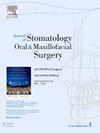基于颌面部 CT、CBCT 和口内扫描的改良型牙齿支撑 3D 打印手术导板的准确性:对比研究。
IF 1.8
3区 医学
Q2 DENTISTRY, ORAL SURGERY & MEDICINE
Journal of Stomatology Oral and Maxillofacial Surgery
Pub Date : 2024-10-01
DOI:10.1016/j.jormas.2024.101853
引用次数: 0
摘要
背景:与骨支持导板相比,牙支持手术导板具有更高的准确性。本研究旨在改进牙支持导板的制作,使其与肿瘤切除手术相兼容,并研究其准确性:方法:纳入在改良的齿或骨支持手术导板辅助下进行截骨术的肿瘤患者。采用虚拟手术规划(VSP)对齐从术中计算机断层扫描(CT)图像中提取的三维(3D)模型。记录实际截骨平面与术前平面之间的距离和角度偏差。对牙支撑和骨支撑导向器之间以及基于 CT、锥束 CT(CBCT)或口内扫描仪(IOS)的牙支撑导向器之间的截骨偏差进行了比较分析。结果:本研究共纳入了 60 例患者,81 个切除平面。在牙支持组中,截骨平面和角度的平均偏差分别为 1.39 mm 和 4.30°,而骨支持组为 2.16 mm 和 4.95°。在牙支持异型导板组中,CT、CBCT 和 IOS 截骨平面的平均偏差分别为 1.39 mm、1.47 mm 和 1.23 mm。无论支持导板的牙齿数量和位置以及截骨线的位置如何,改良的牙齿支持导板的准确性都保持一致:研究结果表明,改良牙齿支撑手术导板在颌面部区域表现出很高的精确度,有助于减少手术剥离软组织的数量。本文章由计算机程序翻译,如有差异,请以英文原文为准。
Accuracy of the modified tooth-supported 3D printing surgical guides based on CT, CBCT, and intraoral scanning in maxillofacial region: A comparison study
Background
Tooth-supported surgical guides have demonstrated superior accuracy compared with bone-supported guides. This study aimed to modify the fabrication of tooth-supported guides for compatibility with tumor resection procedures and investigate their accuracy.
Methods
Patients with tumors who underwent osteotomy with the assistance of modified tooth- or bone-supported surgical guides were included. Virtual surgical planning (VSP) was employed to align three dimensional (3D) models extracted from intraoperative computed tomography (CT) images. The distances and angular deviations between the actual osteotomy plane and preoperative plane were recorded. A comparative analysis of osteotomy discrepancies between tooth-supported and bone-supported guides, as well as among tooth-supported guides based on CT, cone-beam CT (CBCT), or intraoral scanner (IOS) was conducted. The factors influencing the precision of the guides were analyzed.
Results
Sixty patients with 81 resection planes were included in this study. In the tooth-supported group, the mean deviations in the osteotomy plane and angle were 1.39 mm and 4.30°, respectively, whereas those of the bone-supported group were 2.16 mm and 4.95°. In the tooth-supported isotype guide groups, the mean deviations of the osteotomy plane were 1.39 mm, 1.47 mm, 1.23 mm across CT, CBCT, and IOS, respectively. The accuracy of the modified tooth-supported guides remained consistent regardless of number and position of the teeth supporting the guide and location of the osteotomy lines.
Conclusions
The findings indicate that the modified tooth-supported surgical guides demonstrated high accuracy in the maxillofacial region, contributing to a reduction in the amount of surgically detached soft tissue.
求助全文
通过发布文献求助,成功后即可免费获取论文全文。
去求助
来源期刊

Journal of Stomatology Oral and Maxillofacial Surgery
Surgery, Dentistry, Oral Surgery and Medicine, Otorhinolaryngology and Facial Plastic Surgery
CiteScore
2.30
自引率
9.10%
发文量
0
审稿时长
23 days
 求助内容:
求助内容: 应助结果提醒方式:
应助结果提醒方式:


